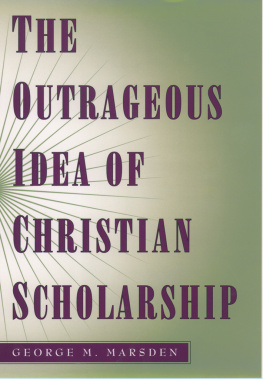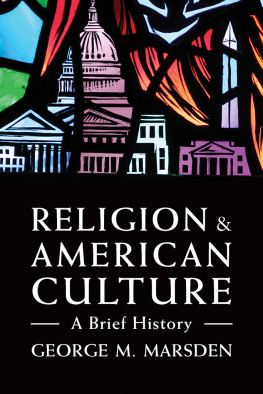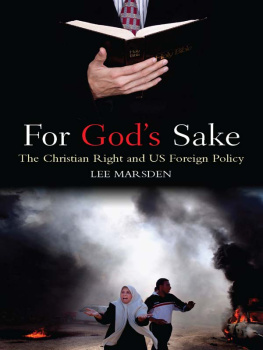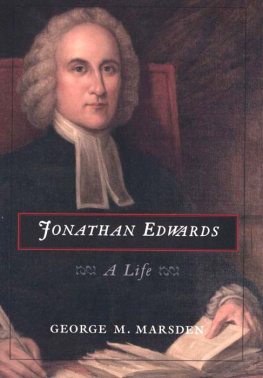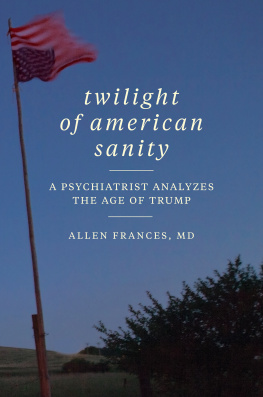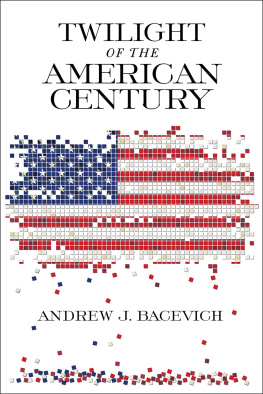More Advance Praise for
THE TWILIGHT OF THE AMERICAN ENLIGHTENMENT
This remarkable book gives us an insightful narrative of how we have gotten to our present failure to manage increasingly diverse cultural realities in North America. Marsden charts the various efforts over several decades in the last century to sustain a pluralism on the basis of a cultural consensusboth atheists for Niebuhr and the New Religious Right had their own versions of this project. In exposing the underlying reasons for their failure, Marsden points the way to a challenging but exciting journey toward a truly inclusive pluralism.
Richard J. Mouw, Professor of Faith and Public Life, Fuller Theological Seminary
George Marsdens learned and accessible analysis of the intellectual culture of the 1950s is must reading for anyone trying to make sense of our current debates over religion in American public life.
John Fea, Messiah College, author of Was America Founded as a Christian Nation?: A Historical Introduction
Piercing and succinct yet astonishingly elegant, The Twilight of the American Enlightenment anatomizes the mind of 1950s America with the blend of precision and flair, moral conviction and compulsive readability that the eras public intellectuals prized in their literature. Marshaling his unmatched historical expertise and command of modern American religion and thought, Marsden guides his reader through the last days of certaintythe early Cold War moment when liberal thinkers earnestly shored up their societys shared faiths even as they faced signs of eroding consensus and impending cultural revolution at every turn. Marsdens book is a courageous and path-breaking account of the pivot point in twentieth-century American life.
Darren Dochuk, author of From Bible Belt to Sunbelt: Plain-Folk Religion, Grassroots Politics, and the Rise of Evangelical Conservatism
In this compact but powerful analysis of American life and thought in the years since the Second World War, George Marsden shows why neither a triumphant secular liberalism nor a restored religious consensus can serve as a rallying point for national unity. Instead, he makes a case for a pluralism that treats the widest possible range of religious and nonreligious perspectives as equally deserving of protections and recognition, and rejects the privatization of religious speech and expression. The result is a book that is as much about dawning as about twilight, one that not only provides a fresh and compelling view of postwar America, but offers a fresh vision of the road ahead, a future in which our emerging debates over the meaning and limits of religious liberty will be of central and growing importance.
Wilfred M. McClay, G.T. and Libby Blankenship Chair in the History of Liberty, University of Oklahoma
THE TWILIGHT OF THE AMERICAN ENLIGHTENMENT
The 1950S and the CRISIS of LIBERAL BELIEF
GEORGE M. MARSDEN
BASIC BOOKS
A MEMBER OF THE PERSEUS BOOKS GROUP
To my former students, with thanks for all they have done
Contents
Introduction
Many Americans think of the 1950s as a time when American culture made sense. Some of us can remember why. We had won the war, we were enjoying unprecedented prosperity, and we were surrounded by visible signs of progress. Comfortable suburbs sprang up everywhere. I remember well how, in the spring of 1949, when I was ten years old, the fields near my home where we used to roam were suddenly marked off with patterns of stakes. A building project was launched with some fanfarethe developers even gave away aluminum horseshoe tokens with a 1949 penny in the center. By the next spring, our town had a full-fledged suburb, where I would soon be delivering newspapers. In such places, more and more young families could participate in the American dream of owning their own homes endowed with up-to-date modern conveniences. Everyone seemed to take the ideal of the conventional family for granted. The father went off to work, and the mother dedicated herself to raising the children . Typically, the front yards on my paper route were littered with bicycles and tricycles. For many people in the 1950s, an expanding amount of free time could be dedicated to entertainment (a small blue-gray TV flickered in most picture windows), leisure, and sports. Children and teenagers were among the chief beneficiaries of these changes, enjoying a whole youth culture of rock n roll music, films, TV shows, comic books, sports, and activities designed especially for them. Not everyone yet shared in the American dream, of course, but the nation was working on that. The society was becoming more and more inclusive, and the people within it were increasingly sharing similar values. Granted, a lot of problems remained to be solved. Yet there was little reason not to believe that, if peace could be maintained, progress would continue.
In many ways, the mid-twentieth century was a time of tremendous optimism. Americans were constantly being reminded that theirs was the best nation on earth. They heard every day that their happiness and contentment would only increase, particularly if they acquired the latest products. Probably no one quite believed all the hype, but still, in many ways, things (and it was especially things ) were better than they had ever been. As Alan Ehrenhalt, author of The Lost City , put it in that engaging look back at growing up in Chicago, it was not that the 1950s were a golden age... but that they were a time when life as it was seemed so much better than life might have been. Everyone could remember or had heard of enduring the hardships of the Depression, or could look back to or imagine coming of age in 1943, when boys were sent off to an incredibly grim world war.
Ehrenhalt recalls especially the forgotten virtues of community in America that still prevailed in the 1950s. Most folks lives were shaped by the community of the neighborhood or town in which they lived. Well-known local people typically owned and ran the stores that were part of that community. Even when families moved to the suburbs, they worked hard at creating a sense of togetherness through community organizations and churches. One of the dimensions of the urban neighborhoods was the presence of authoritysometimes arbitrary authority. That was especially true for those who lived in Catholic neighborhoods, where parish priests often ruled with an iron hand. Every child who attended a Catholic school could recall nuns whose lives seemed dedicated to being Gods agent for enforcing discipline, order, and uniformity. In all these communities, Catholic and otherwise, the authoritarian father, easily angered by the laxness and indifference of the younger generation, was a figure everyone knew of either first or second hand. Yet according to Ehrenhalt, it is not just nostalgia to regard such occasionally strict authority as a fair price to pay for a sense of genuine communitya sense of community that has been lost for so many Americans of later eras that seem to be shaped by the chaos of choice.
It is easy to understand why many people today might wish for a return to the virtues of those seemingly simpler times. First of all, it is human nature to look back on an earlier era, especially the days of ones youth, as being more coherent than the disruptive times of later years. At least that has been the way it has looked to Euro-Americans ever since the 1660s, when Puritan preachers were contemplating an American -born generation and lamenting the decline from the days of the founders. For cultural conservatives today it is especially understandable to think of the 1950s as a time when traditional morality and religion were still respected in the cultural mainstream. New York Times columnist Ross Douthat has written fondly of the place that religion held in society during the Eisenhower years, when what Douthat has depicted as a sort of consensus Christian orthodoxy had wide influence in American public life. Certainly, there was more public respect for religion then than there is at present. In many public schools of the 1950s, days opened with the Pledge of Allegiance, a Bible reading, and the Lords Prayer. Traditional Judeo-Christian standards, such as monogamous, heterosexual marriage, were the dominant public norms. Even some cultural liberals who today would not approve of the ideal of stay-at-home momsor of censorship according to the Motion Picture Production Codecan celebrate The Greatest Generation. That was, as Tom Brokaw famously described it, the World War II generation, the generation that came home from the war to apply the same passions and disciplines that had served them so well in the war to building the most powerful peacetime economy in history and to bringing stunning achievements in many fields.


